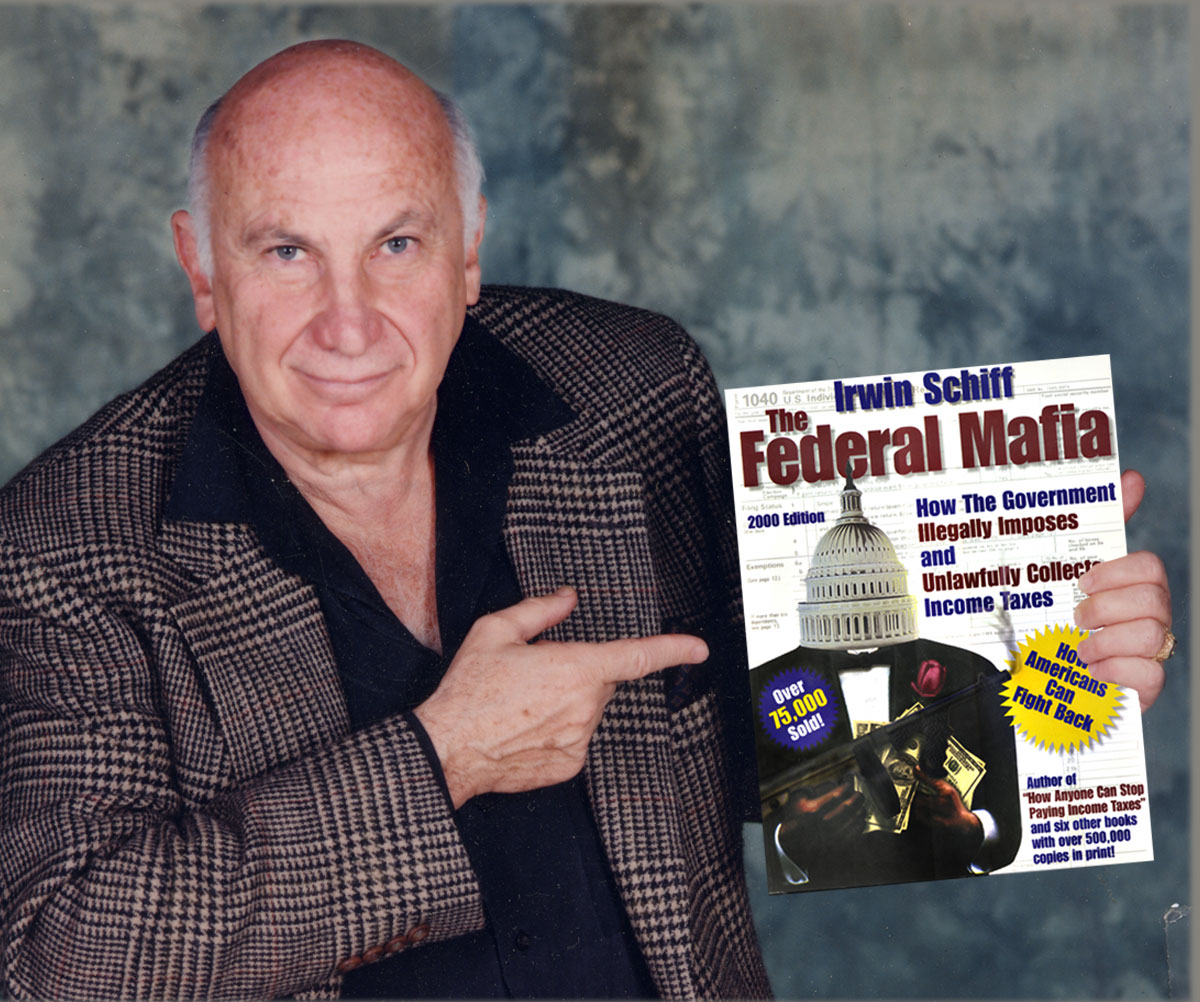Tax protester Irwin Schiff, father of investor Peter Schiff, is currently serving a 12-year prison sentence for income tax evasion, preparation of false income tax returns, and aiding in the preparation of false income tax returns. Schiff has found himself in court for tax evasion upon several occasions, and each time the arguments he’s asserted have been rejected. Though Schiff’s example is a reminder to libertarians how not to practically approach the Internal Revenue Service, he has a certain level of popularity among those who unfortunately believe his wrong assertions about the Internal Revenue Code and tax law in general.
Given that Schiff is currently barred from selling his most recent book, The Federal Mafia, he makes it available online for free. Below I address several false claims made by Schiff in his books, as well as on his website, which have long been rejected by the courts.
Claim #1: No American is legally required to file an income tax return.
Schiff asserts that no provision of the Internal Revenue Code requires anyone to file tax returns, and that the income tax is strictly voluntary. He points to the fact that the word “voluntary” appears in the Form 1040 Instruction booklet and other IRS publications.
Actual Tax Law: The occasional use of the word “voluntary” in IRS publications refers to the fact that current tax law allows for taxpayers to initially determine the “correct” amount of tax and file the required forms instead of the government determining this at the outset. The requirement to file a tax return is set by Internal Revenue Code sections 6011(a), 6012(a), and 6072(a). It is also further clarified by Treasury Regulation Sec. 1.6011-1(a). Additionally, the courts have repeatedly upheld this requirement: Helvering v. Mitchell, United States v. Gerads, United States v. Tedder, United States v. Richards, and Woods v. Commissioner.
Claim #2: No American is legally required to pay income tax.
Here Schiff makes a similar argument, common among tax protesters that no provision within the Internal Revenue Code requires the payment of income tax and that the system is voluntary.
Actual Tax Law: The payment of income tax is explicitly imposed by section 1 of the Internal Revenue Code (titled “TAX IMPOSED”) and described again in sec. 6151, which notes the time and place for paying tax shown on tax returns. Relevant court cases affirming the requirement include: Adams v. Commissioner, United States vs. Gerads, Wilcox v. Commissioner, United States v. Bressler, United States v. Schulz, and Packard v. United States.
Claim #3: Wages received for personal services are not income.
Schiff asserts that the income tax only applies to “corporate profits” and that wages are not taxed under the Internal Revenue Code.
Actual Tax Law: Under code section 61, “gross income” is defined as income from whatever source derived and section 61(a)(1) explicitly includes compensation for services. Unless specifically excluded, income from whatever source is presumed to be income under section 61. The courts have consistently upheld the position that wages fall within the definition of compensation for services under section 61(a)(1). For examples, see Ledford v. United States, United States v. Connor, Casper v. Commissioner, Connor v. Commissioner, Lovell v. United States, Perkins v. Commissioner, Funk v. Commissioner, Lonsdale v. Commissioner, and Rowlee v. Commissioner.
Claim #4: Federal Reserve Notes are not money.
In United States v. Schiff, Schiff argued that Federal Reserve Notes do not constitute money, and therefore are not income for purposes of the income tax.
Actual Tax Law: The taxability of Federal Reserve Notes as money has been upheld in the following cases: United States v. Rifen, United States V. Condo, Jones v. Commissioner, United States v. Rickman, and United States v. Daly.
Conclusion
 Most libertarians oppose the income tax, and this makes superficially plausible arguments like Irwin Schiff’s seem very appealing. These responses to false legal claims are not justifications of the income tax system or defenses of the IRS, but rather an attempt to help people avoid misleading arguments that can land them in unnecessary (and unwanted) trouble.
Most libertarians oppose the income tax, and this makes superficially plausible arguments like Irwin Schiff’s seem very appealing. These responses to false legal claims are not justifications of the income tax system or defenses of the IRS, but rather an attempt to help people avoid misleading arguments that can land them in unnecessary (and unwanted) trouble.
Schiff is not the only one who has been harmed by being convinced of these claims. For example, in United States v. Burdett, Warren Burdett relied on Schiff’s book How Anyone Can Stop Paying Taxes for his defense, employing the argument that the income tax system was voluntary and that wages were not taxable income. The result for Burdett was a jury conviction for federal tax evasion. Other individuals who have found themselves in court by being convinced of Schiff’s frivolous legal arguments include Christopher and Pamela Harrison, Scott Haynes, Kenneth Heath, Joseph Letscher, David Middleton, Robert Mosel, James Payne, David Pflum, and Steven Swan.
Since the inception of the IRS Criminal Investigation Division in 1919, its conviction rate for federal tax prosecutions has never fallen below 90%. This statistic should always be kept in mind by tax protesters who decide to put the arguments of Irwin Schiff on trial.
Cody Liddicoat is a tax accountant and CPA, and he holds a BA in Accounting and Finance from Eastern Washington University. Nothing in this article should be construed as giving legal or tax advice to any individual.

